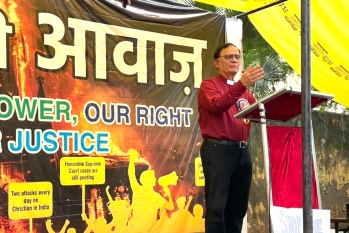
America is drowning in its own hype. We swipe, scroll, and self-promote—curating our personas like digital avatars, convinced that if we just post the right picture or land the right job, we’ll finally feel whole. AirPods blur the line between presence and distraction. Social media crowns swagger over substance. Leadership is too often reduced to a glossy head shot and a title.
Then, unexpectedly, clarity emerges—not from a pulpit or Bible conference, but from a golfer.
While American media was buzzing over a viral photo of a CEO entangled with his HR chief at a Coldplay concert, a meme-worthy snapshot of our self-awareness deficit, Scottie Scheffler, the world’s top-ranked golfer, was quietly modeling something better across the Atlantic.
In a pre-tournament press conference at the 2025 Open Championship at Royal Portrush, Scheffler didn’t talk about his stats. He didn’t boast about his Masters wins or his Olympic gold. Instead, he spoke like a modern-day Solomon:
“You work your whole life to celebrate winning a tournament for a few minutes… It’s fulfilling from a sense of accomplishment, but it’s not fulfilling from the deepest places of your heart.”
Even our greatest victories leave the soul hungry without something deeper.
It was a stunning moment. A superstar, on the eve of a golfing major, going full Ecclesiastes. “Vanity of vanities,” Solomon wrote, “all is vanity” (Ecclesiastes 1:2). Scheffler echoed that refrain, reminding a world addicted to applause that even our greatest victories leave the soul hungry without something deeper.
Days later, Scheffler would go on to win the Claret Jug, his fourth major, joining historic company by shooting under 68 in all four rounds. But there were no ego-driven mic drops. Instead, he said, “I’m blessed to play this game, but if it ever affected my wife or son, that’d be my last day out here.” For Scheffler, identity isn’t found in his swing—it’s anchored in his Savior.
Long before he was the No. 1 golfer in the world, Scottie Scheffler was a teenager with a quiet fire in his belly. At junior tournaments in Texas, other kids strutted or sulked; Scottie just worked: silent, focused, unnervingly calm. Coaches and competitors noticed. He had a fierce internal drive, but he wore it loosely. He never barked at caddies or blamed bad lies. One coach described him as “the fiercest gentleman I’ve ever seen.”
It’s that same quiet intensity, now burnished by faith, that sets Scheffler apart today. In an era when athletes curate brands before they win trophies and pastors chase platforms as eagerly as pulpits, Scottie is…different.
The wisdom of Solomon in a culture of self-worship
Success is fleeting. Fame is fickle. Even wisdom has its limits.
In a world chasing novelty, Solomon’s ancient wisdom is both sobering and bracing. The man who had it all: power, wealth, influence, pleasure, looked at the sum of his life and declared, “All is vanity and a striving after wind” (Ecclesiastes 1:14). His conclusion? Success is fleeting. Fame is fickle. Even wisdom has its limits.
In Ecclesiastes 1:11, Solomon wrote:
“There is no remembrance of former things, nor will there be any remembrance of later things yet to be among those who come after.”
We think our achievements will earn us immortality, but Solomon, who ruled nations and penned 3,000 proverbs, warns that history will forget even the mighty. I often illustrate this with a simple list of names: William Wheeler, Henry Wilson, David Tompkins. Sound familiar? They were vice presidents of the United States—once the second most powerful men in the country.
Forgotten now.
Jonas Salk helped eradicate polio in 1957. And yet, fewer than one-third of Americans can identify his name today.
Do you really think they’re going to remember us?
Scottie Scheffler understands this, and one can only assume he was meditating on Solomon’s words before crossing the Atlantic. Even in his fame, he carries himself with the humility of a man who knows his trophies will gather dust—but his impact as a husband and a father, and his soul, will endure.
He lives simply. Despite his global success, Scheffler still frequents a local Chipotle restaurant; not because it’s posh, but because he genuinely enjoys it. For a man atop the world golf rankings, it’s a refreshingly down-to-earth reminder: he’s more comfortable with a burrito bowl than a red carpet.
The self-awareness crisis
In contrast, our culture seems addicted to self-importance. We praise CEOs who are hailed as disruptors, or influencers who monetize authenticity. Yet behind the filters and the personal brands is a striking lack of self-awareness. We don’t just forget that we’re mortal—we act as though we’re immortal.
Scheffler’s comments, and more importantly his character, point to a better way. His life aligns with Proverbs 3:5–6:
“Trust in the Lord with all your heart and lean not on your own understanding; in all your ways acknowledge Him, and He will make your paths straight.”
Scheffler is grounded in whose he is.
While others seek identity in what they do, Scheffler is grounded in whose he is. After his 2024 Masters win, he said simply: “I’m a faithful guy. I believe in Jesus… It’s not anything I did.”
This isn’t performative religion. It’s a theology of the heart: one that understands the difference between excellence and idolatry, between achievement and identity. Scheffler has learned the wisdom of Ecclesiastes 2:24:
“There is nothing better for a person than that he should eat and drink and find enjoyment in his toil. This also… is from the hand of God.”
Scheffler enjoys his craft. He excels in it. But he holds it loosely. He sees his gift not as a god, but as a grace. He reminds us of a modern-day Eric Liddell from Chariots of Fire; fiercely competitive, yet profoundly grounded. Like Liddell, Scheffler feels God’s pleasure when he plays. But Scheffler is defined by something far deeper: not the scoreboard, but the smile of his Savior. Victory doesn’t validate him—faithfulness does. His truest mission field isn’t the 18th green, but the hearts of his family, his friends, and the people God places in his path.
What will matter in the end?
Let’s be honest. When you're on your deathbed, with all the tubes and wires, and loved ones by your side, you won’t be talking about the deal you closed in 2025 or the fancy car you leased in 2024 or shooting your age in golf or that once in a lifetime miraculous hole-in-one. No. You’ll talk about your faith. Your family. Your friends.
And that’s what Scheffler, like Solomon before him, is asking us to consider: If that’s what we’ll care about when we’re dying, why isn’t it what we’re living for now?
In Ecclesiastes 12:13, Solomon closes with this:
“Now all has been heard; here is the conclusion of the matter: Fear God and keep his commandments, for this is the duty of all mankind.”
Scottie Scheffler may never quote that verse directly. But in his humility, his priorities, and his faith, he lives it.
A call to the Church
Scottie Scheffler’s Ecclesiastes moment is not just a gentle reminder—it’s a quiet reckoning.
For a Church increasingly shaped by curated egos, platform-building, and dopamine-fueled distraction, Scottie Scheffler’s Ecclesiastes moment is not just a gentle reminder—it’s a quiet reckoning.
In an era where even ministry can blur into performance, his life offers a radical alternative: You can pursue greatness without worshiping it. You can be excellent and still walk humbly with your God (Micah 6:8). You can lead with conviction without chasing applause.
Scheffler’s identity isn’t built on his win column, his brand, or even his public declarations of faith—it’s anchored in Christ alone. That’s a necessary challenge for pastors who preach for likes, believers who confuse busyness with holiness, and a Church tempted to measure faith by followers and clicks.
In a recent interview, Scheffler explained how he stays grounded: “I just try to live in the present moment. That’s something I learned through my faith—that God’s with me here and now, and that’s enough.” It’s a statement that echoes Psalm 46:10: “Be still and know that I am God.” It’s not just a golfing mindset—it’s a theological one. And in an anxious age obsessed with the next thing, it’s profoundly counter-cultural.
In a fame-addicted world, Scheffler’s example is a clarion call to recover what we’ve lost: a quiet confidence that comes not from résumé-building but from being hidden with Christ in God (Colossians 3:3). His Open Championship wasn’t merely a triumph of talent, it was a sermon on eternal perspective. When he embraced his wife, Meredith (his Proverbs 31 woman) and son, Bennett, after the win, it wasn’t just a touching image, it was a testimony. A man who knows exactly what matters... and what doesn’t.
Scheffler shows us what it means to live aware. Aware of our mortality, our limits, and our eternal purpose. In a culture of noise, his faith invites us to return to stillness. In an age of self-invention, he reminds us to remember who, and whose, we are.
As the Apostle Paul writes in Colossians 3:2–3:
“Set your minds on things above, not on earthly things. For you died, and your life is now hidden with Christ in God.”
That kind of spiritual awareness is where true greatness begins and where lasting peace is found.
Les T. Csorba is author of the forthcoming book, AWARE: The Power of Seeing Yourself Clearly (August 2025). This piece is adapted from that work. Les is a CEO coach and partner at the executive search and management consultant firm Heidrick & Struggles. With over 30 years of experience in executive search and leadership consulting, he is an authority in self-awareness. He has been instrumental in shaping the next generation of corporate leadership in the energy, political, and nonprofit sectors. A sought-after speaker and commentator on leadership, Les has been featured on FOX News, MSNBC, and CNBC with Maria Bartiromo. His insights on executive leadership, corporate governance, and talent development have appeared in Corporate Board Member magazine, Oil and Gas Investor Magazine, the Houston Chronicle, the Chicago Tribune, and USA Today. His expertise in leadership and governance makes him a valuable resource for keynote speaking engagements, boardroom discussions, and executive coaching. Beyond his corporate work, Les is deeply involved in philanthropy and education. He serves on the board of Liberty Energy's Bettering Human Lives Foundation, a nonprofit by Chris Wright, U.S. Secretary of Energy, which provides clean cooking fuel to families living in energy poverty in Africa. He also serves on the board of Yellowstone Schools, a faith-based charter school in Houston. A graduate of the University of California, Davis, Les is the son of 1956 Hungarian refugees. He and his wife, Anne, have been married for 38 years and reside in Houston, Texas, where they enjoy time with their four children and seven grandchildren. Les is a long-time member of Grace Bible Church in Houston, Texas.






